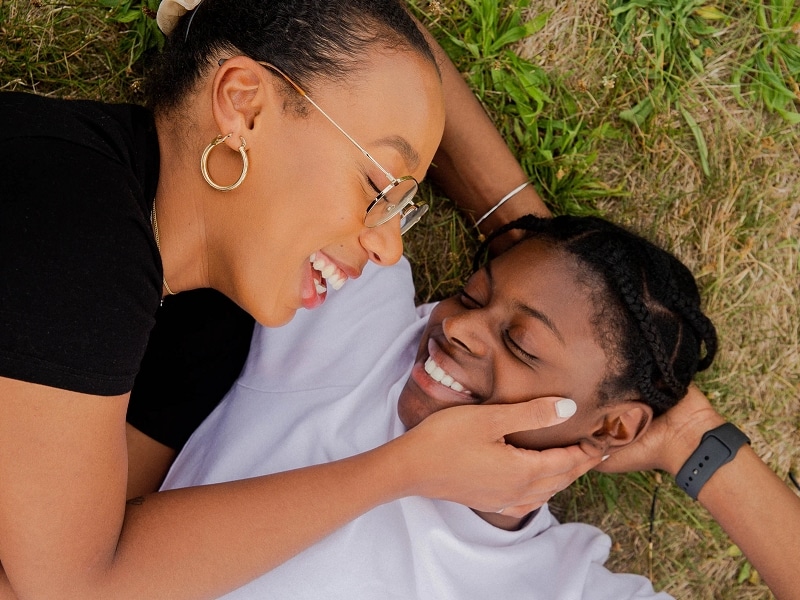“You need to love yourself before you can love someone else.” You’ve probably heard some version of this saying, yet finding The One seems to be the key to a happy life. If you’re not happy single, will you be happy in a relationship?
Besides friends and family, romantic relationships play a significant role in our overall happiness and life satisfaction. Relationship quality is especially important: a supportive and satisfying relationship makes you happier, while an unsupportive one will decrease happiness. But at the same time, relationships aren’t meant to replace therapy, and expecting your partner to erase your insecurities and be the only source of happiness and positivity is most likely a recipe for a failing relationship.
In this article, I’ll take a look at some of the links between happiness and relationships, based both on science and my own experiences.
Contents
Do romantic relationships make you happy
Obviously, relationships play an important role in happiness. Not just an important role, but from friendships to marriages, it seems that the key to happiness lies in relationships. Fairy tales teach us from a young age that true love is an inseparable part of a happy-ever-after, and the same idea follows us into adulthood through books, movies, and music.
Science says so, too. For example, a 2021 study showed that romantic relationship variables, like relationship length and cohabitation, explained 21% of the variance in life satisfaction, with relationship satisfaction being a significant predictor. This implies that a fifth of our happiness is dependent on satisfying romantic relationships.
Romantic relationships add more to your happiness
A 2010 article reports that while family relationships are important, romantic relationships add a new dimension to happiness. The results of the study showed that for people without a romantic partner, only two factors were predictive of happiness: the relationships with their mother and best friend.
For people in a romantic relationship, there were three factors:
- Mother-child relationship quality.
- Romantic relationship quality.
- Conflict.
These results also imply that the role that friendships play in happiness is diminished if the person is in a supportive romantic relationship.
Furthermore, a 2016 study showed that being in a romantic relationship was associated with increased subjective happiness and reduced gray matter density within the right dorsal striatum. The striatum is a component of our brain’s reward system, and the results imply that seeing or spending time with your significant other acts as a social reward, which promotes positive emotions and happiness.
The baggage of insecurity
Something that emerges from most studies on relationships and happiness is that relationship quality is an important factor. High-quality relationships will increase personal happiness while low-quality unsupportive relationships will decrease it.
Although we may sometimes feel inseparable from our significant other, and for many, describing the relationship with their partner as “two halves of a whole” makes perfect sense, relationships do not exist in a vacuum.
We are still individuals in a relationship, and everyone has their own baggage that will affect the relationship. Attachment styles, previous relationship experiences, values, likes, dislikes, and other quirks will all have an effect on the relationship.
Sometimes the relationship will work because of this baggage, sometimes it will work despite the baggage. And sometimes, the baggage is too big to ignore or overcome. You can probably look past the socks on the living room floor, but overcoming deep insecurities is much harder.

American psychologist Jennice Vilhauer writes that while it’s normal to doubt yourself once in a while, chronic feelings of insecurity and inadequacy can be damaging to intimate relationships. Insecure actions like always asking for reassurance, jealousy, accusing, and snooping erode trust, aren’t attractive and can push your partner away.
According to counselor Kurt Smith, one partner’s insecurity sets up a one-sided situation where one person’s needs completely overshadow the others and having to routinely reassure someone of your love and commitment can be exhausting. That imbalance will eventually cause what could have otherwise been a happy relationship to fall apart.
While some people look for security in a relationship, others will look for acceptance. It’s perfectly reasonable to expect your partner to accept you with flaws and all, but a partner’s acceptance can’t replace self-acceptance.
In fact, according to American psychologist and psychotherapist Albert Ellis, the main ingredient of a successful relationship would be two logical thinking partners, who accept themselves and each other unconditionally.
Can you be truly happy alone?
Bringing your baggage into a relationship might not do it any good, but if relationship factors explain 21 percent of the variance in happiness, can you really be happy single?
Another way to look at that particular finding is that the other 79 percent can be explained by other determinants of happiness, like friendships and family, finances, job satisfaction, self-fulfillment to name a few.
I’m at the age where many of my friends are getting married, or at least have settled down in committed relationships. Some are having children, most have a pet or two. I walk past a bridal boutique on my way to work and I would be lying if I said I don’t occasionally gaze wistfully at the gowns on the window.
But at the same time, I wouldn’t say I’m unhappy being single. I have a fulfilling career that’s not making me rich, but does pay enough to allow me to pursue my hobbies. I have friends and a generally warm relationship with my family. And I certainly have felt unhappier in relationships than I do now.
There is some evidence to back up my anecdotal claims. A 2008 study reports that while people in a relationship are more satisfied with their relationship status, there’s no significant difference in the overall life satisfaction between single people and people in a relationship.
Of course, I have the privilege of having first hand experience from relationships that allows me to make these comparisons. There are communities of people, like the ForeverAlone subreddit, for whom a relationship can seem almost like a miracle cure. Understandably so, considering the importance almost all cultures place on romantic relationships.
But being single also allows us to focus on ourselves. Relationships are all about give-and-take and compromise. Sometimes you have to put your own plans on the backburner so that your partner can focus on theirs. It’s a natural part of relationships, but often, figuring out what you want requires the opportunity to put yourself first.
I have also found that singlehood requires certain self-honesty. You can’t hide behind day-to-day squabbles or socks on the floor to explain your irritability or blame your partner for riling you up. When you’re alone, it’s all you. (And that’s okay!)
Overall, high-quality relationships seem to be a booster for happiness. A supportive partner can help you be the best version of yourself, but it’s not their job to fix you or combat your unhappiness.
It’s worth remembering that romantic relationships aren’t the only relationships. Friendships and family relationships can provide security and acceptance, too, and if you ask nicely, most friends are more than happy to give you a hug if you need it.
💡 By the way: If you want to start feeling better and more productive, I’ve condensed the information of 100’s of our articles into a 10-step mental health cheat sheet here. 👇
This Cheat Sheet Will Help You Be Happier and More Productive
Thrive under stress and crush your goals with these 10 unique tips for your mental health.
Wrapping up
Romantic relationships are definitely an important part of life and a good relationship is worth striving for. However, they aren’t a miracle cure: the insecurities we expect our partner to fix may end up straining the relationship instead. Romantic relationships can boost and amplify positivity and help you become the best version of yourself, but you shouldn’t wait for a partner to do that – you can thrive on your own!
What do you think? Do you agree with the studies? Are you happily living a single life, or do you want to share some of your personal examples? I’d love to hear about it in the comments below!


